Forging the Ring and Opera's Future
There is good news about San Francisco Opera's upcoming summer season of three Ring cycles. SFO General Director David Gockley told a meeting of contributors last week that all but $500,000 of the $24 million special budget has been raised already, and 84 percent of the tickets are sold.
Otherwise, SFO’s finances in the world of a continued recession continue to present a great challenge. Fiscal 2010 had a deficit of $1.5 million on the annual operating budget of $65.2 million, and the future requires the company to do more with less, while getting rid of the deficit.
Included in those figures is approximately $10 million borrowed from the company endowment for running costs, which must be repaid within a limited period. Sale of property on Indiana Street within five years may be the solution.
While Gockley's long campaign for use of an annex to be built at the neighboring War Memorial Veterans Building is unsuccessful, there is a next-best-thing scenario with the offer of the use of the fourth floor and basement after the building undergoes seismic retrofit and reconstruction in 2013.
Additionally, SFO is expecting to have the use of Herbst Theatre, which will be expanded and modernized — meaning it is to have a real stage and backstage facilities.
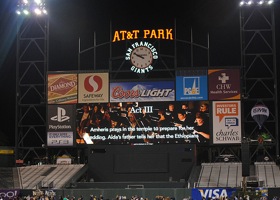
Top priorities for Gockley and the administration is to expand the contributor base — currently half of all donations come from 15 families — and deal with upcoming labor negotiations taking place before contracts expire on July 31. (Incidentally, San Francisco Symphony's labor contracts expire November 2012, soon after the beginning of the 101st season.)
Gockley stressed the importance of increasing membership of the pivotal Bel Canto Society from the current 300 to 1,000 members by 2016.
Look for several stagione productions in the near future, such as a dozen performances of a popular opera with star power, say Tosca, with Angela Gheorghiu and Patricia Racette.
The next Opera in the Ballpark performance — of Turandot on Sept. 25 — will be a matinee, rather than in the evening, because of... Cal football! Apparently, the team's switch to AT&T Park will force the change. Will the HD telecast be visible in daylight? Gockley said that, since previous shows used only one-third the available power on the big screen, that should not be a problem.
Yakov Kreizberg Dies
Russian-born conductor Yakov Kreizberg, brother of Semyon Bychkov, died last week in his Monte Carlo home, after a long fight with cancer. He was 51 years old.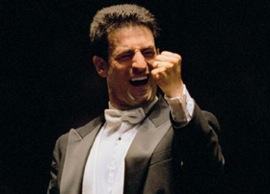
Kreizberg was chief conductor and artistic advisor of the Netherlands Philharmonic Orchestra and Netherlands Chamber Orchestra. He served as music director of Komische Oper Berlin from 1994 to 2001, and principal conductor of the Bournemouth Symphony Orchestra from 1995 to 2000.
Kreizberg was a finalist for the music directorship of the Minnesota Orchestra, before Osmo Vänskä was named to succeed Eiji Oue. He was also a popular guest conductor and was named music director and artistic director of the Monte Carlo Philharmonic Orchestra as of last season.
Apparently, Kreizberg — born Bychkov, in Leningrad — took his mother’s name, and had little to do with Semyon Bychkov, whose career developed earlier. Kreizberg immigrated to the U.S. in 1976 and attended the Mannes College. At the Los Angeles Philharmonic Institute, he was assistant to Michael Tilson Thomas.
He accompanied Roberta Peters on the singer's tours in the late 1980s. He was married to the conductor Amy Andersson, with whom he had two sons.
Another Provocative, Circulation-Building 'Best List'

From the April issue of BBC Music Magazine, the "Top 20 Conductors of All Time" —
1. Carlos Kleiber (1930-2004) Austrian
2. Leonard Bernstein (1918-1990) American
3. Claudio Abbado (b. 1933) Italian
4. Herbert von Karajan (1908-1989) Austrian
5. Nikolaus Harnoncourt (b. 1929) Austrian
6. Sir Simon Rattle (b. 1955) British
7. Wilhelm Furtwängler (1896-1954)
8. Arturo Toscanini (1867-1957) Italian
9. Pierre Boulez (b. 1925) French
10. Carlo Maria Giulini (1914-2005) Italian
11. Sir John Eliot Gardiner (b. 1943) British
12. Sir John Barbirolli (1899-1970) British
13. Ferenc Fricsay (1914-1963) Hungarian
14. George Szell (1897-1970) Hungarian
15. Bernard Haitink (b. 1929) Dutch
16. Pierre Monteux (1875-1964) French
17. Yevgeny Mravinsky (1903-1988) Russian
18. Sir Colin Davis (b. 1927) British
19. Sir Thomas Beecham (1879-1961) British
20. Sir Charles Mackerras (1925-2010) Australian
Some local responses, names withheld to protect the opinionated:
I am happy to realize that there are only four of this list of 20 whom I did not see conducting: Furtwängler, Toscanini (both died too early), Gardiner, and Mravinsky. In my opinion Klemperer, Reiner, Bruno Walter, Eric Kleiber, and Levine missing from the list. I definitely disliked Harnoncourt, found Boulez terribly boring, and don't like Gardiner recordings. Delighted that Gergiev is not included, presently he is the most overrated artist.
No Solti here (yay). No J. Levine here (ok, I can live with that, sort of agree: these are glamour-cats). Five Brits here out of the 20 (consider the source). No Muti (well, that must reflect his personality, not the insight he brings). These choices are surely mostly driven by recordings made, even Mravinsky (but no thanks to DG), are the recordings a reflection of reputation, or vice-versa? But it's all good clean fun I suppose.
I might have put Kleiber at the top of the list, though I know he has his detractors, but to put Rattle and Boulez over Monteux, Mravinsky, and Davis! And I'm intrigued to see that Fricsay even got on, not that I've anything against Fricsay, it's just that nobody seems to remember him these days.
'Celebración!' for Girls Chorus
TheSan Francisco Girls Chorus will hold its 2011 gala in Herbst Theatre on March 25, under the title of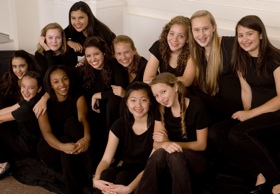 "Celebración," a Latin American themed concert with the band LaTiDo, and featuring music created in and inspired by Latin America.
"Celebración," a Latin American themed concert with the band LaTiDo, and featuring music created in and inspired by Latin America.Conducted by Artistic Director Susan McMane, the event also features a reception, dinner, and live auction.
The program includes music by Ernani Aguiar, Eduardo Plaza, Heitor Villa-Lobos, Guido Lopez Gavilán, and Anders Endroth, besides traditional Mexican music.
A highlight of the program is Villa-Lobos' "Cantilena" from Bachianas Brazileiras, No. 5, featuring eight cellos.
Berkeley Symphony ED to Leave Position
Berkeley Symphony Executive Director Jim Kleinmann will step down at the conclusion of this season, his fifth as CEO, "to pursue the growth and further development of PlayGround, the playwright incubator he co-founded in 1994."
During Kleinmann's five-year tenure, Kent Nagano ended his long tenure, and a two-year search for a successor resulted in the appointment of Joana Carneiro as only the third music director in the orchestra's four-decade-long history. A national search for Kleinmann's successor will be launched shortly.
Maltman: the Next Best Thing to a Recital
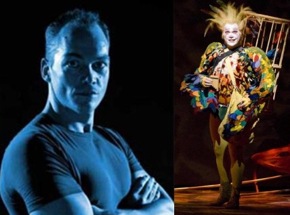
A diabolical thought: What if a really fast writer submitted a review of Friday's San Francisco Performances recital by Christopher Maltman, and then a speed-demon editor (such as mine) published it instantly. Oops.
That thought was the only sign of the Devil at Herbst Theatre, where an angelically civilized audience gracefully accepted the announcement that the baritone lost his voice just an hour before the concert was to begin.
Say this for San Francisco concert audiences: They may cough now and then, or have brief discussions during quiet passages, but they do not run unfortunate producers out of town at the point of pitchforks.
And so, everybody was mild-mannered, understanding, and supportive of beloved S.F. Performances Director Ruth Felt, never mind the wasted slogging through rain and all that.
Felt, in response, did something civilized herself: She invited the audience to a half-hour program consisting of heartfelt and believable apologies from Maltman, and then a delightful question-and-answer session with the scheduled accompanist, Malcolm Martineau.
The great pianist oozes charm and intelligence, and even his indiscretions are civilized. Who, for example, would hold against Simon Keenlyside the anecdote from Martineau that when the baritone discovered on his way to the stage that moths had eaten portions of his pants (not worn for a long time), he grabbed a Sharpie and filled in the holes ... on his skin.
Martineau would not pick favorites among the many singers he has accompanied — "variety is the best part of the work" — but he was unhesitating in naming his favorite accompanist: Benjamin Britten. As a composer, Britten knew about colors, Martineau said, and you can hear it in his piano performances.
(Another composer that Martineau pointed out in the audience: Jake Heggie, who answered my question of "que pasa?" by saying he is working on his first piano concerto. Getting away from voice? No, there will be voices.)
Variety is also the rule for the nitty-gritty of working with singers. Some spend a great deal of time in rehearsals, Martineau said, while others — especially Barbara Bonney and Bryn Terfel — usually have just a single run-through.
Maltman and Martineau have just come from Venice, the singer's first experience of the city, and the planned program reflected the city: Fauré's "Five Melodies of Venice," Schumann's "Venetian Songs," gondola songs by Schubert and Mendelssohn, Reynaldo Hahn's "Venezia," and a few non-Venetian works by Schubert. Felt, Maltman, and Martineau joined in promising to reschedule the same program as soon as possible. Martineau is due back in Herbst in October with Keenlyside (and preinspected trousers).
This was my second Maltman cancellation, both following the initial laryngeal near-disaster he had at his long-ago Wigmore debut. I wonder if that recital was canceled as suddenly as Friday's, and whether the London audience would have been as gracious as the folk here. Probably, one wants to believe.
Chopin, Cage, and Apocalyptic Kewpie
"Clad in a black sleeveless kimono, dark raccoon-eye makeup and a high mohawk, the soloist resembled an apocalyptic Kewpie doll," says the New York Times about violinist Hahn-Bin, who gave a concert in the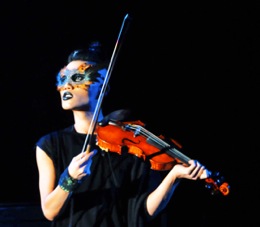 Morgan Library last month, and later appeared in Los Angeles.
Morgan Library last month, and later appeared in Los Angeles.
His appearance was greeted by "silver-haired classical-music enthusiasts" with "gasps," but apparently, his performance was impressive. Referring to himself as the Renaissance of Classical Music, Hahn-Bin's Web site reports on last week's concert in L.A.'s Hammer Museum as follows:
Drawing from his spiritual journey through Tibetan Buddhism, The Five Poisons sees Hahn-Bin in the role of a musical bodhisattva warrior, surveying the five kleshas Desire, Ignorance, Anger, Pride, and Jealousy with music by John Cage, Maurice Ravel, Frédéric Chopin, Witold Lutoslawski, Barbara White, Claude Debussy and more.
Lucia Tonight
San Francisco Opera's Grand Opera Cinema Series continues today at Sundance Kabuki Cinemas with a 7:30 p.m. screening of the company's production of Donizetti's Lucia di Lammermoor.
With Natalie Dessay in the title role, tenor Giuseppe Filianoti as Edgardo, and baritone Gabriele Viviani as Enrico, the Teatro del Maggio Musicale production, by Graham Vick, is led by French conductor Jean-Yves Ossonce.
Symphony Silicon Valley's 10th Anniversary Season
The successor to the San Jose Symphony, which went bankrupt at age 123, is alive and kicking. Operating without a music director, Symphony Silicon Valley will be led by guest conductors again for the next season:Oct. 1-2 — Gregory Vajda, conducting the Bartók Concerto for Orchestra and Brahms' Symphony No. 2
Oct. 22-23 — Giampaolo Bisanti, Stravinsky's Petrouchka and Beethoven's Violin Concerto No. 1, with Ju-Young Baek
Dec. 3-4 — Jose-Luis Novo conducts works by Kodály, Milhaud, and Marquez, with Jon Nakamatsu as the soloist in Chopin's Piano Concerto No. 1
Jan. 14-15 — Mitchell Sardou Klein conducts Corigliano's To Music, Tchaikovsky's Symphony No. 5, and Mozart's Sinfonia Concertante for Violin and Viola, with Robin Mayforth and Patricia Whaley
March 30-April 1 — George Cleve, Bach's Brandenburg Concerto No. 1, and Beethoven's Symphony No. 9
May 12-13 — Paul Polivnick leads Dvorák's Slavonic Dances No. 1, Holst's The Planets, and David Amram's Triple Concerto, with the composer as soloist on pennywhistle
June 2-3 — William Boughton conducts Grieg's Peer Gynt Suite No. 1, Sibelius' Symphony No. 2, and Rachmaninov's Rhapsody on a Theme by Paganini, with pianist Ning An
Academy Orchestra Concert
Led by Music Director Andrei Gorbatenko, the San Francisco Academy Orchestra is ending its season on April 3, with a concert in Calvary Presbyterian Church.The program includes Mozart's Symphony No. 1 and Bach's Brandenburg Concerto No. 3, plus Jan Kritel Vanhal's Concerto for Double Bass, with Scott Pingel as soloist; he is principal bass of the San Francisco Symphony.
The Academy's advisory board includes Dmitri Hvorostovsky and Anna Netrebko.
Musicians' Lawyer Indicted
Labor lawyer Leonard Leibowitz, notorious for bringing symphony orchestras to the edge of extinction for his "won't take no for an answer" negotiating tactics, surrendered in a Manhattan courtroom last week, indicted for stealing from his clients in the past.
According to a statement from the office of the U. S. Attorney for the Southern District of New York, Leibowitz — who currently represents the musicians of the still-on-strike Detroit Symphony Orchestra — is charged with "embezzling union funds, which carries a maximum sentence of five years in prison, and one count of falsification of annual reports filed by a union, which carries a maximum sentence of one year in prison."
The charges relate to 1997, when Leibowitz, as founder of and lawyer for the now-defunct IAA union representing the American Ballet Theater dancers and stagehands, wrote IAA checks to himself, his law firm, and his former wife totaling over $350,000. Forgery is among the counts in the indictment.
